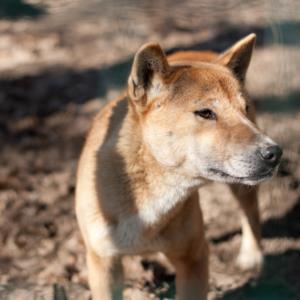Why do New Guinea Singing Dogs Bark so Much?
Would like to know why do New Guinea Singing Dogs bark a lot? Barking is the most used form of interaction for all canines, and it can suggest a whole series of things depending on the current circumstances. Here is a list of a few of the key reasons New Guinea Singing Dog dogs bark a lot:
1. Being territorial or protective: When someone or another animal enters your New Guinea Singing Dog’s territory or space, that might possibly prompt excessive barking. As the danger approaches closer, the barking will normally end up being louder.
2. From worry: Some New Guinea Singing Dog dogs will bark at anything that may surprise them, whether that’s a sound or object.
3. Feeling tired or lonely: Like all canines, New Guinea Singing Dogs are pack animals. Often when left on their own for long periods of time, they can become sad or bored which can lead to barking from being dissatisfied.
4. When welcoming or playing: New Guinea Singing Dogs usually bark when meeting individuals or other pets. It’s normally a pleased bark with jumping and tail wags.
5. Attention Seeking: New Guinea Singing Dogs are known to bark when they desire something, including going for walks, playing, snacking etc..
6. From separation stress and anxiety: New Guinea Singing Dogs with severe separation anxiety will usually bark a lot when left home on its own, at an extreme rate. They might also have other symptoms like pacing, destructiveness, and even anxiety.
How to Stop a New Guinea Singing Dog from Barking?
Here’s an easy list of techniques that can assist stop your New Guinea Singing Dog from barking. Keep in mind, the longer your New Guinea Singing Dog has had barking problems, the longer it will require to alter their ways.
1. Remove the motivation: Find out what they your New Guinea Singing Dog gets out of barking and get rid of those incentives.
2. Ignore their barking: If you think your New Guinea Singing Dog is woofing to get your attention, disregard their barking for as long as it takes them to quit. When finally silent, reward them with a snack.
3. Keep your New Guinea Singing Dog tired: Ensure your New Guinea Singing Dog is getting enough physical and mental activity every day. Keep in mind, a tired New Guinea Singing Dog dog is a good dog and is much less likely to bark from boredom or frustration.
4. Contact a professional pet trainer: If you think your New Guinea Singing Dog is a compulsive barker and have attempted these actions with little to no success, you need to think about getting in contact with a certified professional pet trainer for more help.
New Guinea Singing Dog Barking at Night, How to Stop it?
There are numerous reasons that your New Guinea Singing Dog may be barking at night. This includes worry, boredom or alert, aloneness, attention seeking, inadequate exercise and more. While all these reasons can cause your New Guinea Singing Dog to bark at night, the answers are rather easy.
The only real resolution might be to bring them indoors if your New Guinea Singing Dog sleeps outside at night. Leaving them outdoors alone might trigger them to bark from boredom or isolation, or even expose them to noise that sets off barking.
If your New Guinea Singing Dog sleeps indoors but reacts to other dogs barking outside, think about putting a white noise device in the space they sleep to drown out the outdoor noises.
Another fantastic way to prevent New Guinea Singing Dog barking at night is to exercise them before bedtime. Good exercise can assist tire them out and make them sleep a lot simpler.
New Guinea Singing Dog Barking at other Dogs, How to Stop it?
There are numerous reasons that your New Guinea Singing Dog may be barking at other dogs. This consists of playfulness, enjoyment, territorial threats, fear or anger, under socialisation and more. While all these factors can cause your New Guinea Singing Dog to bark at other canines, the remedies are quite simple.
The best way to prevent your New Guinea Singing Dog from barking at other pets is to gradually work on their socialisation. Slowly begin introducing them to other dogs in safe environments and reward them for good behaviour. Once you improve their socialisaton skills, they’ll find out how to act around other pet dogs and will stop barking at them.









